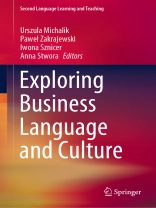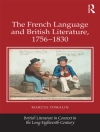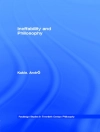This book aims to present the results of research in the sphere of business language and culture, as well as the experience of pedagogical staff and practitioners concerned with broadly understood business. The highly complex nature of contemporary business environment, approached from both the theoretical and practical standpoint, does not cease to prove that research into business studies cannot be dissociated from the cultural and linguistic context. The chapters included in this book were contributed by academics and practitioners alike, which offers a balanced approach to the topic and ensures high levels of diversity together with an undeniable homogeneity. They were gathered with a view to show various aspects of business language, perceived both as a medium of communication and as a subject of research and teaching. They are concerned with business culture as well, including business ethics and representations of business in popular culture. Owing to its multidisciplinary approach, the book presents a roadmap towards successful functioning in business settings, highlighting such issues as education for business purposes, the study of language used in business contexts, the aspects of cross-cultural communication, as well as ethical behaviour based upon different values in multicultural business environments. Given its multifarious character, the book surely appeals not only to academics, but also to the interested laymen and students who wish to expand their knowledge of business studies and related phenomena.
Tabla de materias
1.Business English Today: The Need for Intercultural Approach.- 2.Millennials as second language users. The analysis of communication patterns employed for L1 and L2 interactions.- 3.Managing prosumption in university education – case study approach.- 4.The lack of business experience vs. the lack of appropriate linguistic background in business English teaching context.- 5.Generational Values and Generational Confrontations: Ethical Challenges in the Light of Contemporary Economic and Social Trends.- 6.National Responsibility: The Missing Element of Business Ethics.- 7. Online Word of Mouth as a Source of Employment Information: A Comparative Analysis of the Language of Values in Employee Reviews and Testimonials.- 8.The Clash between Polish and Chinese business etiquette trends. The differences, similarities and misunderstandings.- 9.Naming the Weapon: A study of UK and USA Tank Names.- 10. Dimensions of communication in international teams.- 11. Socializing at work – an investigation of small talk phenomenon in the workplace: a questionnaire study.- 12. Sociopragmatic and strategic functions of humour in intercultural business contexts.- 13. Business and academic cultures in contact: Some insights from academic communication practices and research.- 14. Always Be Closing: An ABC of Business in English Language Feature Films.- 15. The Language of M – a Female Manager (as Played by Judi Dench).
Sobre el autor
Paweł Zakrajewski, Ph.D. is an assistant professor at the Institute of Linguistics, Faculty of Humanities University of Silesia in Katowice, Poland. He received his Ph D in Linguistics from the University of Silesia in May 2015. His scientific interests center on discourse analysis, rhetoric, communication – especially new media – translation, and cross-cultural & cross-linguistic comparative studies. Recently, he has been involved in a number of projects related to genre and linguistic analysis, effective communication, public relations and ESP translation. Dr Zakrajewski is also an assistant editor of TAPSLA Journal (Theory and Practice of Second Language Acquisition) and a member of AEDEAN – Asociación Española de Estudios Anglo-Norteamericanos. Recent publications include: Researching Second Language Learning and Teaching from a Psycholinguistic Perspective. Studies in Honour of Danuta Gabryś Barker (2016). Springer, (co-edited with Dagmara Galajda and Miroslaw Pawlak); Young Scholars on Theoretical and Applied Linguistics: Research Projects (2016). Oficyna Wydawnicza – Wyższa Szkoła Humanitas, (co-edited with Maria Wysocka, Dagmara Gałajda and Artur Kijak); Multiculturalism, Multilingualism and the Self (2017). Springer, (co-edited with Danuta Gabryś-Barker, Dagmara Gałajda and Adam Wojtaszek).
Urszula Michalik, Ph.D., University of Silesia, is a senior lecturer at the Institute of Linguistics, Faculty of Humanities University of Silesia in Katowice, Poland. She received her M.A. in English Studies in 1997, and Ph D in Sociology of Communication from the University of Silesia in 2002. Her scientific interests center on ESP-Business English and such related issues as corporate culture, cross-cultural communication in the world of business, marketing, advertising and public relations. She has also devoted a lot of work and interest to such areas in business as negotiations, meetings and presentations. Moreover, she is concerned with genre and register analysis of business texts, and analysis of the language and cultural issues in the use of humour. Among her recent publications are Cultural awareness as a vantage point for managers operating internationally–a case of American and Japanese managers (2013), co-authored with dr hab. Mirosława Michalska-Suchanek: The word as a tool of persuasion in sales promotional letters in the light of the theories of needs and emotions (2014), co-authored with dr hab. Mirosława-Michalska-Suchanek: The Challenges of global marketing-cultural variables (2014), Język jako narzędzie budowania tożsamości produktu w promocyjnych listach sprzedażowych- Language as a tool of building company identity in Sales promotion letters (2015), Language of values-the core values of banks (2017), and, co-authored with Iwona Sznicer, The Use of Humor in Cross-Cultural Business Environment (2017).
Iwona Sznicer, MA, is a lecturer at the Institute of Linguistics, Faculty of Humanities University of Silesia in Katowice, Poland. Her academic interests focus on ESP -Business English and such related issues as corporate culture and cross-cultural business communication. She is also interested in genre and register analysis. Her experience includes teaching courses in, among others, Specialized Varieties of English and Current Economic and Social Issues. Among her recent publications are Business Presentation. A Cross-Cultural Dimension (2014), Stereotypes in Cross-Cultural Business Communication (2015) and, co-authored with Urszula Michalik, The Use of Humor in Cross-Cultural Business Environment (2017). She is also a co-author of a textbook English for Business Purposes-Finance and Politics (under preparation).
Anna Stwora is a Ph D candidate at the Institute of Linguistics, Faculty of Humanities University of Silesia in Katowice, Poland. Her research interests oscillate around multimodal discourse of advertising, especially in its metaphorical and humorous dimensions, as well as around specialized registers viewed from the psycholinguistic and sociolinguistic standpoint. She is also interested in cognitivism, communication studies, and contrastive linguistics. From 2017 till 2019, she was the chairwoman of NEOlinguists – the Ph D candidate association that operates under the patronage of the Department of Philology of the University of Silesia. She has been involved in several projects including seminars, workshops, and conferences devoted to humor and contrastive studies, as well as to business language and culture. Her recent publications include Humor Research Project: Explorations in Humor Studies (in press). Cambridge Scholars Publishing (co-edited with Marcin Kuczok and Mariola Świerkot); “How to befriend an ad? A sociolinguistic and sociocultural inquiry into social media ads on Facebook” (2018); “Money Hanging in My Closet? Various Conceptualisations of Money in English” (2018); and “Language Change Through Ads: The Impact of Advertising Messages on Contemporary Idio- and Sociolects” (2018).












